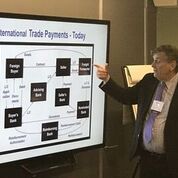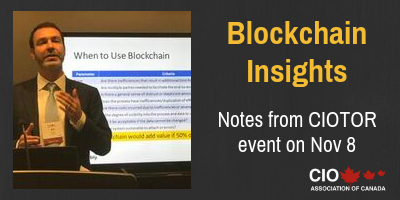This article is written by Claire Dobbin and Mitchell Fong
There’s no question about it – Blockchain is here, it’s maturing, and it has the ability to disrupt every industry.
CIOCAN partnered with TransformationWorx to host an event that went beyond introductory topics to tackle the “so what” of Blockchain implementation – what’s hype vs. reality; the feasibility of large-scale transactions; privacy restriction challenges; regulatory uncertainty hurdles; and more.
A Blockchain State of Play for 2019 
Bob Tapscott began with an excellent presentation on how far the Block chain industry has come and where it might go. He emphasized that the technologies of the fourth industrial revolution – machine learning, AI, autonomous vehicles, VR – are closer than we think, with GM’s newest Chevy excluding a steering wheel. “Blockchain may be the underlying foundation for this revolution”, he explained.
Despite this potential, we are past the peak of the hype curve, and the market is now beginning to decline. He credited some of this disillusion to how Bitcoin and Ethereum are tightly held and far too slow, unacceptable in a high transaction production application. He explained the appeal in certain applications, such as combating inflation in 3rd world countries, but capitalist country implementation still poses some challenges.
For Blockchain of the future to succeed, it must have credible throughput, at minimum, an identity framework, strong governance, and security defense. Funding remains high for some Initial Coin Offerings (ICO)’s, and for applications like insurance or healthcare, the future seems promising. He ended by summarizing that the trust (thrust?) is inevitably moving from institutions to mathematics, but the true cryptocurrency of the future has yet to materialize.
A Practitioner’s Guide to Blockchain Implementation
TransformationWorx’ founder, Dawood Khan, also addressed decline in Blockchain PoC’s in 2018. However, up to 15% of organizations surveyed by PwC this year have live deployments. There’s a push moving forward for “token-less” consortium Blockchains and hybrid implementations. And for these near-term Blockchain initiatives, a skills gap exists.
Dawood articulated that the reason many organizations fail is due to the fact that the majority of PoC’s are technology driven, lacking strategic assessment of the value and feasibility of the project. When implementing a Blockchain project, you must:
- Identify Value: Understand Business Opportunities & Feasibility
- Capture Value: Develop Strategy, Design and Architect Solution
- Extract Value: Solution Implementation and Evolution
He compared the polar differences between enterprises and Blockchain, focusing on the strengths of scaling, privacy and data storage in enterprises with decentralization, security, and data immutability favored in Blockchain.
Blockchain Beyond Cryptocurrency: Applications of DLT
Blockchain program graduate Ari Brojde has built his own Blockchain business, Estateably. The company seeks to use Blockchain technology to solve the grueling, inefficient, costly and drawn-out process of providing beneficiaries their inheritance in estate settlements.
He detailed that this application checks all the boxes for beneficial Blockchain implementation – time, trust, process, cost, transparency, security – demonstrating clear market fit and business case. The company leverages Hyperledger Fabric enterprise-grade technology to establish data privacy and automation.
Developing Solutions on the Blockchain: First-Hand Experience
Ronald Chan and Alex Sheluchin capped off the presentations by describing the platform they built to launch their full-stack Blockchain development services company, CoinAccord. They measure success by the number of projects they work on, and highlight the most exciting part in creating public projects. Alex touched on challenges in establishing banking partners and resistance from the community; however, he believes that large-scale applications are possible, and we’ll see applications come to fruition that have never been done before.
The Challenges in Privacy Policies and Regulation Uncertainty
In a rapid-fire Q&A session that followed, the challenges and hurdles with regulation and privacy were identified. While regulation is inherently important and must be in place, it seems to fall behind in the Blockchain industry, like an indefinite game of cat and mouse. This leaves tremendous uncertainty and creates a dynamic market for those implementing Blockchain applications. The second discussion was focused on privacy, highlighting emerging policies such as HIPAA and GDPR, and sharing the potential example of paying for your Starbucks coffee in Bitcoin, which could then give the company data from your entire transaction history.
Event attendees left the evening with a comprehensive view of Blockchain applications today, accompanied by new ideas on what the future may hold.
Blockchain Professional Certifications
The evening opened with recognition of the second wave of graduates from the unique, Canadian-pioneered, CIO Certified Blockchain Professional (CCBP) program. Graduates received their certificates and spoke highly of the program, with the Toronto Chapter president Sherif Sheta crediting the quality of the instructors in allowing him to truly determine “fact from myth”.

Claire Dobbin is a recent mechanical engineering graduate turned project manager employed in the healthcare technology space and working towards PMI certification. Claire is passionate about innovative products that solve real issues, and relishes in the opportunity to unite a team towards this success.

Mitchell Fong, PMP, P.Eng. is a Project Management Consultant to Bank of Montreal Capital Markets. He has worked with many of the world’s best-known companies including Apple, Boeing, Comcast, Johnson & Johnson, JP Morgan Chase, Microsoft, NASDAQ and Verizon. Mitchell serves as a Board Member at PMI Toronto (President) and Professional Engineers Ontario (PEO) – East Toronto (Director). He volunteers with PMI Education Foundation (PMIEF) and the Chief Information Officers Association of Canada (CIOCAN).
